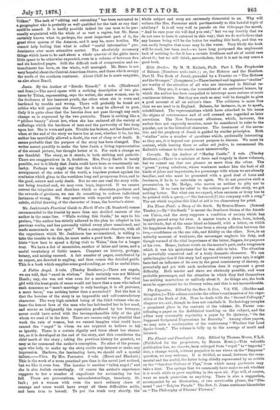A Fallen Angel. 3 vole. (Tinsley Brothers.)—There are angels, we
are told, that "excel in wisdom." Such certainly was not Mildred Heath; nay, she was not wise even for a mortal woman. For what girl with the least grain of sense would not know that a man who talked such nonsense as "man's marriage is only bondage, it is all pretence, a mere farce," was nothing better than a scoundrel ? But the fact is that the heroine of the story is an impossible and self-contradictory character. The very high-minded being of the third volume who re- fuses the honest love of the man who has befriended her in her need, and scorns so indignantly the reparation proffered by her betrayer, never could have acted with the incomprehensible folly of the girl whom we read of in the first. There are causes only too plentiful that work the ruin of women, but we cannot imagine what could have caused the " angel " in whom we are required to believe to fall so ignobly. There is a certain dignity and force shoat her charac- ter, as it is developed at the end of the story, and this constitutes the chief merit of the story ; taking the previous history for granted, we _ may so far commend the author's conception. No other of the person- ages who help to make up the story excite any interest or make any impression. Harlow°, the fascinating hero, we should call a special failure.— Viva. By Mrs. Forrester. 3 vols. (Hurst and Blackett.) This is the work of a more practised pen than is the novel just noticed, but we like it even loss. The heroine is another "fallen angel ;" and she is also foolish exceedingly. Of course the author's experience suggests to her a number of expedients for accounting for her fall. There are provocations, misunderstandings, treachery, M- imic; yet a woman with even the most ordinary share of courage and sense would have swept all these difficulties aside, and been true to herself. To put the truth very shortly, the whole subject and story are extremely distasteful to us. Why will writers like Mrs. Forrester stick pertinaciously to this hateful topic of adultery ? It is all very well to parade on the title-page the moral, "And be sure your sin will find you out ;" but we say frankly that we do not care to have it enforced in this way; that we do not believe that any human being will be the better for reading this book, and that we can easily imagine that some may be the worse. Very likely the book will be road, has been read—we have long postponed the unpleasant task of noticing it—for it has a certain liveliness and air of scold ease about it ; but we still think, nevertheless, that it is not in any sense A good book.


































 Previous page
Previous page